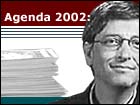
NEW YORK (CNN/Money) -
So is Microsoft's stock really in trouble, supported only by a myth of growth? Let's take one last look at this company. While growth may be slowing, in absolute terms Microsoft remains a money-making miracle. Though margins are falling, they are still far higher than virtually anyone else's.
Whether it uses its $40 billion to generate income -- what Connors calls its "annuity stream from the treasury" -- to fund R&D or to pay a dividend, the company produces a torrent of money that is one of the all-time great achievements in business.
What's more, the landscape is littered with competitors who underestimated the commitment, efficiency and single-minded dedication to winning that pervades the Microsoft culture. Talking to executives at all levels, you are swept away by their unwavering belief that Microsoft's best days are still ahead.
Even as they acknowledge that the old days are coming to a close -- they have already switched the company mission statement from "A PC on every desktop and in every home," to the broader (and, yes, even more ambitious) "Great software anytime, anyplace and on any device" -- they are quick to point out that their company is, if you look at it in a certain light, still an upstart, with only one-third the revenue of IBM, plenty of new markets to enter and room to grow.
"To say the opportunity has largely been tapped, I just disagree with that," says Windows vice president Weed. "In the United States, I think local area home networks are just getting under way. And only 12 percent of households in the world have a PC. We don't have a Hindi localization of Windows yet. China will be the second-largest PC geography by the end of this year. There are lots of places we can innovate."
Microsoft is like a surfer at the end of a long day. It has already ridden two giant business waves (its DOS and Windows eras) and now it is paddling hard toward the ocean, scanning the horizon for that last big swell. But there's no guarantee that the wave will come Microsoft's way. On the other hand, if you believe that the digital world is still evolving and that connectivity will continue to pervade our world, is there anyone else you'd bet on to win?
And there is one last possibility too -- that Microsoft's cash hoard is part of a strategy to move from being a growth company to being a grown-up company on the model of General Electric. In the pantheon of highly valued stocks, after all, there are a few, such as GE, that are long past their high-growth days yet enjoy premium P/E multiples because they always make their numbers.
Even as it continues to search for the next wave of growth, Microsoft is working hard to replace its reputation for hypergrowth with one for machine-like consistency. When talking about Microsoft's revenue and financial performance, executives and analysts alike frequently use words like predictable, smooth and visible.
| |
 More on Microsoft
More on Microsoft
| |
| | |
| | |
|
To combat the inevitable boom-and-bust cyclicality of the tech business, the company has long attempted to sign up corporate customers to long-term service and licensing contracts that provide regular revenue flow. But it's not just enterprise customers. Microsoft's newfound love of subscriptions includes consumers like those of the MSN ISP (8 million accounts and growing) and longer-term plans for Xbox online gaming or other forms of entertainment.
Such licensing agreements and subscription sales allow the company to bulk up a balance-sheet entry called unearned revenue -- essentially sales that have been made but must be formally recognized over time as the company fulfills its side of the contract.
Thanks to these arrangements, Microsoft now boasts a massive (and growing) $5.3 billion in short-term unearned revenue that, like the cash hoard, acts as a buffer, giving analysts a preview not only of how well sales are going now, but also of how much revenue they'll see in the upcoming quarters.
Microsoft is already renowned on Wall Street for efficiently managing quarterly expectations, and if the company can temper the inherent volatility of the software business to become as consistent as GE, if it can succeed in making that reputation switch from hypergrowth to hyperconsistency, there's no reason the stock's premium valuation can't survive.
Then Microsoft will be free to begin disbursing its excess cash to shareholders through dividends -- sending the stock price up, rather than down. That's the theory, anyway. Executing that vision is another matter. The road ahead may be a little bumpy, but hang on for the ride.

|

